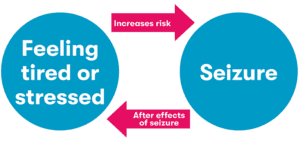Jump straight to the information you need
What is stress?
Stress is a normal reaction to feeling under pressure or threatened. It happens when you feel you can’t manage or control the situation you’re in. Most people will experience stress from time to time.
Work, money, relationship problems and big life changes are common reasons.
If it’s only a small amount of stress that lasts a short time, it isn’t usually harmful. But if it goes on for a long time, it can start to affect your health.
-
What are the symptoms of stress?
Stress can cause lots of different symptoms.
It can make you feel anxious, irritable, tense and overwhelmed. It can have physical effects in your body too. These can include:
- Difficulty breathing
- Blurry vision
- Sleep problems
- Headaches
- Tense muscles
- Sweating
- Skin problems
Stress can make you behave differently too. You might lose your temper more easily or feel tearful. It can make it hard to think or concentrate.
You might drink alcohol or smoke more than you usually do, or eat more or less than normal.
-
What does stress do to your body?
When you are in a threatening or challenging situation, your body responds by making ‘stress hormones’.
These hormones make your heart, muscles and other organs ready to take action. This is sometimes called the fight-or-flight response. It’s a normal reaction that allows you to deal with a potentially dangerous or harmful situation.
Once the pressure or threat has passed, your stress hormone levels will usually go back to normal. But if you’re constantly under stress, the hormone levels in your body will stay high.
This leads to the symptoms of stress listed above. Long-term stress can increase risk of:
- High blood pressure
- Heart problems
- Stroke
- Back pain and other types of pain caused by muscle tension
- It can also make you more vulnerable to infection

A seizure can happen when I get stressed about the little things that happen in life, such as an unplanned busy day or having a lot on my plate all at once. Stress can also happen when I get my epilepsy medication changed which can be a tough time.
To manage stress, I personally find listening to music and podcasts, reading books and going out for fresh air helps.
I also chat to others on social media who are in similar shoes to me as it helps to know there are other people to relate to who feel the same way."
What is the link between stress and epilepsy?
There are several ways stress and epilepsy are linked:
- Living with epilepsy can be a cause of stress
- Stress can trigger seizures in some people
- Stress may be one of many factors that contribute to the development of epilepsy in some people
- Stress can also cause non-epileptic seizures
How does epilepsy cause stress?
Living with a long-term condition like epilepsy can be very stressful. People with epilepsy have everyday life stresses, the same as anyone else. But there can be factors relating to having epilepsy that cause stress too. These include:
- Getting a diagnosis
- Having a seizure, or worrying about having a seizure
- Dealing with the unpredictability of seizures and fear of losing control
- Having to make lifestyle changes to reduce risk of seizures, or not being able to drive
- Managing epilepsy at work
- Managing epilepsy medicines
- Negative reactions, or stigma, about epilepsy from other people
How does stress affect seizures?
Some people with epilepsy find that they are more likely to have seizures when they feel stressed.
This can be particularly likely if they have been stressed for a long period of time. For other people with epilepsy, stress doesn’t affect them in the same way.
If you are stressed you might also:
- Forget to take your epilepsy medicines
- Have problems sleeping
- Drink too much alcohol or smoke more
- Feel anxious
- Over breathe (hyperventilation)
These are things that can trigger seizures for some people too.
Can stress cause epilepsy?
Stress can sometimes contribute to people developing epilepsy in the first place. This is more likely if your stress is severe, lasts a long time, or has affected you very early in life.
In very young children, stress affects the development of the brain. In older people, long-term stress can change the way the brain works. The parts of the brain which regulate the stress response are also often involved in epilepsy.
So stress could play a role in triggering seizures, or the development of epilepsy for some people.
How can I manage stress?
People with epilepsy can end up in a cycle, where stress triggers seizures, and having seizures causes further stress. Taking active steps to reduce or manage stress can help to break this cycle. It will help your wellbeing, and may also improve your seizure control.

Acknowledging that you are feeling stressed and what’s causing it is often the first step. Blaming yourself for feeling stressed won’t help. Instead, start thinking about what you can change. If there are particular factors relating to your epilepsy making you feel stressed, think about how you might address these.
- Try to get into a routine with organising your epilepsy medicines. Plan ahead and order medicines well in advance, especially in holiday periods, so you don’t have the worry of running out
- If the possibility of having another seizure is causing you stress, talk this over with those closest to you. You may want to warn them how you might act when you have a seizure, and how they can help. Show them our information on first aid for seizures. You might feel better knowing that your friends or family are more prepared
- You could also look into epilepsy alarms and monitors, and whether these may be helpful for you. Epilepsy alarms are designed to detect seizures and alert someone who can help. You can also use a smart phone to send an alarm when you need help and alert someone to your location. It may reassure you to know this is in place
- Consider telling your employer and work colleagues about your epilepsy if work is a worry for you. Knowing about your epilepsy means your employer may be able to make reasonable adjustments to help you. Putting a plan in place for dealing with seizures at work may take some of the worry and stress away
- Getting used to an epilepsy diagnosis and how it affects your life can take time. Talk to your specialist or epilepsy nurse if you need help or advice on this. You can also contact our Helpline for free, confidential advice. Talking to people who have similar issues can also help. Find out more about how we can help you connect with others
- Taking steps to look after your wellbeing can also help with managing stress. Be kind to yourself. Make time to relax and do the things you enjoy doing. We have more tips on improving mental wellbeing, which can help with stress
- If stress is impacting on your mental health, it’s important to seek professional mental health support.
-
Sources
Balamurugan, E. et al. (2013) ‘Perceived trigger factors of seizures in persons with epilepsy’, Seizure, 22(9), pp. 743–747. Available at: https://doi.org/10.1016/j.seizure.2013.05.018.
Legg, K.T. and Newton, M. (2017) ‘Counselling adults who experience a first seizure’, Seizure, 49, pp. 64–68. Available at: https://doi.org/10.1016/j.seizure.2016.09.012.
Mental Health Foundation (2022). Long term physical conditions and mental health. Available at: https://www.mentalhealth.org.uk/explore-mental-health/a-z-topics/long-term-physical-conditions-and-mental-health (Accessed 18 October 2023)
Espinosa-Garcia, C., Zeleke, H. and Rojas, A. (2021) ‘Impact of Stress on Epilepsy: Focus on Neuroinflammation—A Mini Review’, International Journal of Molecular Sciences, 22(8). Available at: https://doi.org/10.3390/ijms22084061.
Mind (2022). Stress. What is stress? Available at: https://www.mind.org.uk/information-support/types-of-mental-health-problems/stress/what-is-stress/ (Accessed 18 October 2023)
Mind (2022). Stress. Causes of stress. Available at: https://www.mind.org.uk/information-support/types-of-mental-health-problems/stress/causes-of-stress/ (Accessed 18 October 2023)
Mind (2022). Stress. Signs and symptoms of stress. Available at: https://www.mind.org.uk/information-support/types-of-mental-health-problems/stress/signs-and-symptoms-of-stress/ (Accessed 18 October 2023)
Harvard Health Publishing (2020). Understanding the stress response. Available at: https://www.health.harvard.edu/staying-healthy/understanding-the-stress-response (Accessed 18 October 2023)
American Psychological Association (2018). Stress effects on the body. Available at: https://www.apa.org/topics/stress/body (Accessed 18 October 2023)
Galtrey, C.M., Mula, M. and Cock, H.R. (2016) ‘Stress and epilepsy: fact or fiction, and what can we do about it?’, Practical Neurology, 16(4), pp. 270–278. Available at: https://doi.org/10.1136/practneurol-2015-001337.
Novakova, B. et al. (2013) ‘The role of stress as a trigger for epileptic seizures: A narrative review of evidence from human and animal studies’, Epilepsia, 54(11), pp. 1866–1876. Available at: https://doi.org/10.1111/epi.12377.
Friedman, A.R. et al. (2011) ‘Elucidating the Complex Interactions between Stress and Epileptogenic Pathways’, Cardiovascular Psychiatry and Neurology, 2011, pp. 1–8. Available at: https://doi.org/10.1155/2011/461263
Mental Health Foundation (2021). Stress. Available at: https://www.mentalhealth.org.uk/explore-mental-health/a-z-topics/stress (Accessed 18 October 2023)
Mind (2022). Stress. Managing stress and building resilience. Available at: https://www.mind.org.uk/information-support/types-of-mental-health-problems/stress/managing-stress-and-building-resilience/ (Accessed 18 October 2023)
Clare M Galtrey, Marco Mula, and Hannah R Cock (2016) ‘Stress and epilepsy: fact or fiction, and what can we do about it?’, Practical Neurology, 16(4), p. 270. Available at: https://doi.org/10.1136/practneurol-2015-001337.
More information and support
We list lots of organisations who provide further information and advice on mental health and wellbeing on our Getting mental health support page.
Epilepsy and your wellbeing
Learn how you can improve your wellbeing and manage the impact of epilepsy in your life.
Got any questions?
Our expert advisors can help you with any questions you might have about stress or anything else related to living with epilepsy.






